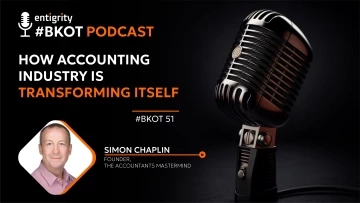In this podcast, our expert speakers Chris Rivera and Martin Moll had discussed The power of offshoring: Nearshoring vs Offshoring. Is there a difference? How to explain it to your clients. Watch the podcast to know more.
#BKOT 23: BUILD A KICKASS OFFSHORE TEAM
NEARSHORING VS OFFSHORING: IS THERE A DIFFERENCE?
Hosted by: Chris Rivera, Director Client relations, Entigrity Offshore Staffing
Guest: Martin Moll, Founder, Breakaway, Bookeeping & Advising
Chris: Alright! Welcome everybody. Thank you for taking your time out of your schedule today and joining us. I'm very excited to bring you for #BKOT23. We'll be discussing offshoring versus nearshoring and a lot of details in regards to that and I have a special guest with me, Mr Martin Moll who is the founder of Breakaway Bookkeeping and Advising and so we're gonna jump right into this again very excited to have you here today coming from Portland Oregon, the opposite side of the country. As you all know I'm here in NewYork city. Martin, thank you so much for joining us, tell us everything about yourself.
Martin: Thanks Chris great to join everyone and yeah so Breakaway Bookkeeping Advising is a fully distributed bookkeeping virtual controller, virtual CFO. We're about a year old, a little more than a year old. We've grown to 17 advisors, we have five more coming when I say advisors, controllers CFOs and bookkeepers we have five more joining us in January, so it's been a crazy year for us, but really exciting. And we have it if you look on our website it's front and center that we use an offshore team and so we're just huge believers in it.
Chris: And didn't you come from a background with KPMG right.
Martin: I do so I started in the big four and then actually went to a regional firm it was AKT at the time and then Aldrich and I stayed there, I was a healthcare partner and then became their CEO and Managing Partner for the last three or four years and then departed last year to take on this adventure. We're honestly have a little bit of a disruptive model so doing this kind of independent of a CPA firm was a choice that we had made and Aldrich, so we had an offshore team in India. It's going on 15 years now so we founded that and then had other firms joined from around the world so we've been it's core to the way I practice.
Chris: Yeah I've done a few dozen of these and you're a very special guest today because in regards to speaking directly about offshoring and the benefits and with your 15 years, I mean it's the concepts are going on for about 25 years and so you've seen it kind of evolve and the benefits for it and so I mean there's a huge power behind this engine of offshoring and so tell me about the over the last 15 years, What do you see that's different now than when you first started engaging the team out there?
Martin: Great question Chris. An adoption and the adaption from the client perspective I'd say is first and foremost whereas you know the standard response is you're sending jobs offshore and there's this sense of response 15 years ago, but certainly even more now was, Do you know how hard it is to find a qualified accountant? And also Do you know what you would like that accountant to be doing? Would you like that accountant to be doing that kind of putting the numbers on the form or would you like them really leaning into your business and helping make a difference. And 15 years ago, generationally you still had a lot of pushback. I think there's drastically less pushback so that's one of the big changes and the other one is just an acceptance. I guess that the benefit of a small world right then the side benefits of having an offshore team or an international team are far more than just sending work away. I mean it it helped our staff and I see it now with breakaway too, to understand that the similarities in the world are there's a lot more similarities than our differences so if you're talking to an accounting team whether it's in Mexico or in India or in you know Bengaluru or on you know Kuala Lumpur wherever it is you recognize that you know god love them accountants or accountants no matter what you know that and so it's really helped from a connectivity and helped our staff be more worldly in their view which of course only translates the benefits to the client.
Chris: Yes exactly! Clients bottom line is; they want a good product, a fair price, fair value and it's harder to do that in America per se simply because the especially with the small to mid-sized market that are trying to scale and grow, initially they can't afford somebody at maybe 30-40 an hour and they don't know where whether options to do except to work instead of 60 hours a week work 80 hours a week. It's just not fair and the idea of setting jobs off. It just it doesn't make sense because it's never just been an American economy. It's always been a world economy and a lot of people don't realize the power of that and so spot on what you said and and the hesitations that have changed over the years.
Now when you're working with the offshore association. Do you have a remote team in the states as well.
Martin: We have one right now in Coimbatore, India which is in the South of India.
Chris: So now you don't have to be fully virtual as a firm but partially virtual with the pandemic has opened up the eyes that it can be done and so do you treat the team any differently that's not onshore or everyone's treated the same?
Martin: That's a great question and that was the business in coimbatore. What is that our team in coimbatore we celebrate whether it's a birthday, whether it's an anniversary. We want to celebrate the team and that's always been and what that it's interesting you talk about during the pandemic, the traction that we get one of the things again lessons learned and we're working on the same thing. With our breakaway team is the sooner I can get someone to actually go to and meet the offshore team. The better responsibility which I know with entigrity may not be possible in every instance but actually the more you can humanize the service right so it's the the worst thing in the world you want is to be like oh yeah I'm just I'm sending it into this black box and I just want a product out right because you're not gonna get it's like actually no I'm sending it to you know thiru I'm sending it to Jay and i'm going to talk to them and yes they're going to make mistakes because they're human right and and but just like any staff that's down the hall then you teach them you tell them and you improve the process and within a year that that relationship has just become enormously valuable.
Chris: Great and so yeah absolutely right you treat everyone the same. And I see that a lot too when working with clients to where it's almost of a whisper where they're asking, should I tell my local team that I'm doing this like it's something bad and I laugh I say no no involve them, have them part of this, who are they going to be reporting to have a part of the interview process, have them be there it's a collaborative effort you know and the whole idea in what we do is to cut to complement the onshore team you know one of the headaches that you guys are doing that you can't find the resources today that we're where we can help you right.
And so that's the idea: speak with the local team, engage them, have them part of the process and so and it can be hard out of sight out of mind. Technology is there and in place it could be a little bit of intimidation for newer clients but once you embrace it and understand it, adopt it makes things a lot easier.
Now we have the idea of nearshoring. I heard outsourcing and offshoring and onshoring right. So it all gets intermingled but there's some key differences. Can you talk about some of those?
Martin: Yeah so it's interesting you know a nearshoring term of art and whether that means that you're using a shared services organization in a lower cost part of the US or you're doing it within the continent. And we're actually, we're moving toward because we talked about you know we're doing both right we're offshoring, we're nearshoring, we're hoping to eliminate both of those terms in our eventually because again if we say look we're a worldwide company.
And yeah and what we will do internally is we will make the decision of where the best most cost-effective services can be provided and one of it's a healthcare phrase that I stole from one of my partner's years ago but you know in healthcare the challenge is to you practice at the top of your licenses right and no one in fact if you do go visit your doctor and he or she is doing a blood draw, you really should be questioning the value you're getting from your doctor because now they know how to do a draw in fact they probably they're as good as you know the lab tech or the phlebotomist it's doing the blood draw. But you want your doctor to be doing the diagnosis right and so the same thing that's the you know whether it's the distributed model is whether it's nearshore whether it's offshore whether it's in Mexico or in Coimbatore India or Columbus you want the best person doing the work at the most efficient price.
I was just having a conversation earlier today. I am an unabashed capitalist right and I do believe that capital markets will then it's not that we're sending jobs away it's that we're creating more opportunities by doing so.
Chris: Well said Martin, well said yeah we're actually and we're heading upon the close of this year we do an annual client survey and a key metric that we're trying to figure out is the increase in onshore hiring and for these firms and so far we're finding it anywhere from 10 to 15 percent but we're trying to finalize everything but refreshing to see that it's really nice to see that and so and that's what it's all about right and you're spot on when you said you know it doesn't matter where the office is. What associate can do the best it doesn't matter where the where are they located it's which one knows this task at hand and you could do it the most cost effective way. So yeah I love hearing that. And then I know that the outsourcing model right you have nearshore onshore offshoring but the outsourcing model with a team approach you know we always get intermingled with that. Have you done some outsourcing and What are your thoughts on that type of model?
Martin: Yeah it's interesting Chris I think one of the things that I would tell anybody using an offshore distributed chair is what it really puts a highlight on is your own processes right. And the best performing firms who use a team and there's been I'm sure you know far better tonight there's been some colossal failures by big fortune 500 companies who say, we're just going to take our entire banking and we're going to send it to Bangalore and then they fail miserably and it's not because it's not bangalore's fault right. It's right that they didn't have the processes and chances are they had processes that worked because you could walk down the hall and you could fix it by talking one-on-one which is fine but again from moving you know to providing best of class services to your clients to your customers, it probably means you're actually not doing that because you don't have the processes in place so that using the offshore team to me, it's just it's a spotlight on your own internal operations and that's true person firm or 10 million person firm. I don't think there's much any difference. It's do you have the processes that allow you to make the decisions and then more importantly then going back to practice at the top of your license then giving the people the freedom to actually look to where they can add value. So it's the key is it's not that you're freeing up time so that you can well ideally, so you can go play golf or you can ride your bike, but it's also that you can then provide and help your clients succeed even more because you're sending and especially the one of the benefits of the team in India is you know we always say it's like yep you can send it off to them at five o'clock, you know when you go home at night or now in a work from home when you walk out of your office and then when you show up at eight the next morning you've got a finished product that's pretty impressive from a client service perspective.
Chris: Yes, I remember when the question I always get asked they were nine to five right and it's like well you know it's India's 10 and a half hours ahead of me 13 and a half hours ahead of you, so there's no 9 to 5. And in the accounting world there's not really a nine to five anyways it's all day every day. So the leveraging that you're leveraging that time zone difference. At first and I got it too I put myself in the client's shoes and reversed but someone told me that like 3 A.M, I'm not getting up at 3AM what am I going to do well how are they going to do this.
But yeah in the beginning it's like once you understand it and once you just kind of tweak your processes and leverage that holy cow, now you're sleeping and work getting done right, whether it's that entry work or heck you could hire senior levels right and they're doing review you get up and you're just signing off work or reviewing it and that's how you start your day with completed projects.
That is another incredible empowerment of offshoring. I mean it's now more beneficial than anything. Now back to the outsourcing model yeah so it's when you have a team approach doing it, it's hard for your day-to-day work but outsourcing you can do, if you have a dedicated team and working with them there's a lot of benefits with that but when working with your offshore team, Do you have like scheduled meetings with them every single day, weekly or I mean how have you structured it in leveraging the time zone as well.
Martin: Great question and at Breakaway one of our core values is it's the buzzword of the day but it's it's asynchronous communication right, so because again we value our own team's ability to pick up their kid from a soccer match or to you know go out for a bike ride which is what I love to do. So even within our own team I mean we do have meetings and we will include include our India team but we're much more you know our preference is to be able to do like a a loom video it's like hey you know here's the update we do our corporate updates to our team as a loom video we don't require a call and then we'll have a little email summary so again that communication format just works naturally with India or you know with with any team.
And what's interesting so even as I said we have worked roughly 20 advisors so we have one advisor who lives in Rio de Janeiro represents U.S companies but lives in rio and we have one advisor who lives half time in Spain any other time half time in Salt lake so even with our own quote unquote state site advisors they're not necessarily stateside. They're distributed themselves and the better you can do that the better for our team like well yeah I can actually represent clients than go live in India if I want. It was again you start to train yourself that geography is a state of mind. You can be anywhere and that's just a really powerful way of doing business.
Chris: Agreed! Now let's talk a little bit about the stigma and the bad reputation and not just about sending the jobs but U.S companies and clients and your everyday citizens right. They think it's unfair because it takes advantage of artificially low affordable wages encouraging different exchange rates and managed exchange rates and then they think it promotes the unsubstantiated labor conditions. So with all this the reputation, how have you overcome that with your team and your and then talk a little bit about the clients.
Martin: That's a really powerful question and I wish I'm competent to answer it from an economic perspective and you know from an economist's point of view other than knowing that the last thing in the world you want to do is pay above market wages for the geography that you're in. But also knowing and we tell this to our clients we pay top of market wages not above market but top of market wages and that works. right
So we and with our India team and it's interesting so as I said you know so we've been doing this for 15 years we some of our teams have been around for 15 years and we've seen them have babies and now the babies are off in high school and it. We know that we're providing solid wages with opportunities for advancement and that again like I said that works. So we address it head on we're also in the geographies we're in we're very active in community social responsibility.
So we'll provide opportunities for those who want to visit India if they want to visit the Norfolk niche and support an orphanage, we'll absolutely love that and again that's the message is you know we've got one world and it's a small world and the more you can embrace that. The richer honestly and I've said this before I'm a better person for having had an offshore team for me it's become life-changing which I know is again maybe a little it's not hyperbole. It really has changed who I am by seeing how small the world is.
Chris: Yes and I get the same question too like they're like $9/hour what's going on here right. The first thing I say is that it's like hiring in your market. I like to make a comparison of anywhere between let's say 17 to 22 of 9 dollars and then it's like as far as qualifications and experience so I start there it's like okay you know now we're comparing apples to apple with experience and qualification then I say a next step is is I have personal experience of a personal story. I live there. You know I'm forever grateful for the CEO who was my host for two months out there and it was very important for me to live out there and see this. And holy cow and in 60 days I've lived in NewYork city since 2012 and in 60 days I saved more money during that time than I have in eight years living in New York city. I mean but what people don't understand it's so cheap and so it's just not it's there's nothing of the stigma and the reputation going on whatsoever it's just simply because it's so cheap to live out there I mean i've been eating all day long in new york city about to eat out fifty dollars guaranteed breakfast lunch dinner.
In India under ten dollars for a whole day if that may be pushing it too far it's just the cost of living it's completely different but they still are knowledgeable they're dedicated they're competent they're skilled they're friendly they are more heartfelt warming the culture is different and and once you embrace that and see it and I'm so thankful to have this experience to share yeah then makes you like okay and I like I love sharing it with the clients it's the experience like no don't worry I thought first hand they're they're having their time and lives out there. And that leads me to now all right so we talked about the power of it the differences but now we have the client right.
So how do you inform the client that you're offshoring and how do and how have you seen the acceptance of it change? Has it always been an issue or has it gotten better? It's still an issue?
Martin: Great question so we do as I shared on if you go to the breakaway website we have it's just part of our core values it's who we are and if you say look I don't want to send a team. I don't want my work going out of the country we'll we don't have any problem with that but we also aren't going to hide the fact that's it's and for all the reasons you and I have talked about in the past and again we are and I'm sure you guys do the same. I mean we do the security checks and the background checks and we have all but the it's the presumption that well but the person down the hall could have, just as you know it's a entigrity. Entigrity is a worldwide attribute and yeah and sadly as is dishonest here, as is so it doesn't really matter that you know you go offshore but we're very direct and include the look you wanna pick up the phone and you know like you said seven in the morning at seven at night. If you wanna chat with the people and you get to know them absolutely we're very open with our model.
Chris: I love it. Yeah don't hide anything and if people are uncomfortable with it but we're not going to do business but if you want this fair value you want this good product you want this price, you know this is what we do, this is how we've been doing it and then the do you have a lot of your associates interacting with your clients too. Because I get asked that quite a bit.
Martin: The great question if they want our model tends to be that our advisors whether it's a bookkeeper, it's a controller or CFO they're sitting down with dashboards with their clients saying okay let's talk about actionable advice. So if you really want to get in your books and ask well how come you know supplies versus maintenance why is this going on here absolutely you have the ability to talk to the team but really in a way we're trying to train our clients as well to say well let's really figure out what truly matters in your financial statements and how you can grow your business and what kind of actionable advice you can get out of it. So that's again that because it's interesting on the bookkeeping side the reason that it's hard to find bookkeepers which it really is in the states the reason it's hard to find really good bookkeepers is because really good bookkeepers turn into really good controllers and CFOs because they're like oh wait well if you do this and next thing you know they've they've elevated out and then you've got it you can you need to continually replace them so that's why we will send a lot of the bookkeeping work offshore so then again the advice we give our clients is the stuff that really matters.
Chris: Yeah our top three services are tax, bookkeeping and audit. So spot on with that and again the working with the clients too. It seems like it's a big hurdle and but bottom line is full transparency on both the company side, your side our side the clients that we're working with and then you know and my side their clients too and and I think over time, this the impression the stigma but I mean it's gonna be a while it's unfortunate how people are against it because the there's nothing wrong with it, whatsoever.
I remember when I started with this company almost four years ago and that was my first thing I was like India nine dollars I'm like what am I getting myself into and I have been my life's been forever changed and I'm just so excited in helping clients on a day-to-day basis grow scale with associates and with clients all over the world. And this is the power that it gives it doesn't you don't have to just work or hire in your own city and area it gives everyone the opportunity to expand and grow. But this is the whole reason for us you know talking about this and I appreciate you coming on today with some very relevant and good conversation.
Now any final thoughts or any last thoughts before we wrap this up today Martin.
Martin: No as you can tell you got two people who love what we're talking about here. I think it's just really powerful and I love what you guys are doing as I when you and I first chatted that's why I think the more you talk about this the more you talk about the benefits, the better off I am again. I don't think it's an understatement to say the better off the world is.
Chris: Yeah and it's funny because I think the accounting community has been kind of slow to move to that remote aspect, virtual aspect. Many companies I mean remote work's been going on for 30 years but some have never opened up office, I mean that's why we work was born in these in these mobile offices that were put in place prior to the pandemic and then on come this and it made everyone realize wait a second I can be virtual, I can do this and then now I don't have to be just here, I can go anywhere and so I hope we continue with this push through the not just American economy but a global economy helping all helping everyone out and scaling and growing on all different levels.
So awesome thank you so much again Martin for taking time out of your schedule and joining us and hope to have you on again soon. Everyone out there today thank you for taking time out and meeting with us again, we're gonna close out #BKOT23 and we will be back soon with more content for you guys. Alright everybody have a good weekend and take care. Martin thank you so much.
Entigrity™ is a trusted offshore staffing partner to over 500+ accountants, CPAs and tax firms across the US and Canada. Our flexible and transparent hiring model gives helps firms of all sizes to hire staff for accounting, bookkeeping, tax preparation or any other task for 75% less cost. As a firm 'run by accountants, for the accountants', Entigrity captures the hiring needs of accounting firms most precisely, providing staff that works directly under your control and management, still you are left with least to worry about compliance, payroll taxes, overheads or any other benefits.

_1642676318-1686039629.webp)



